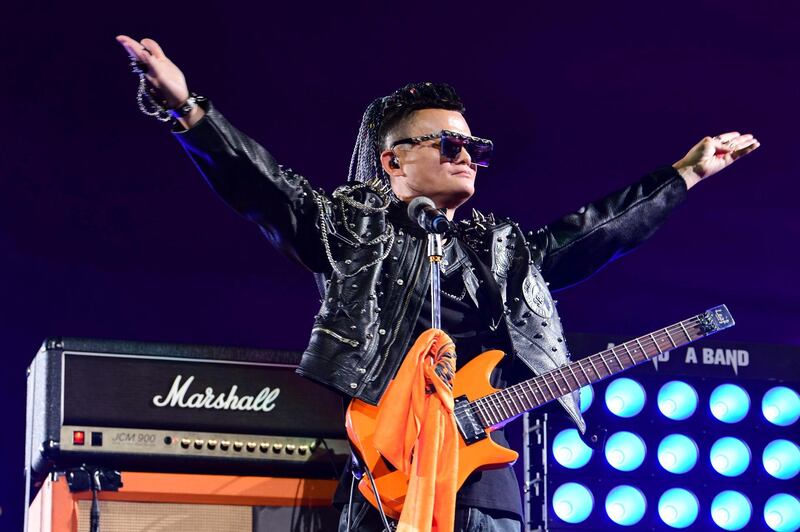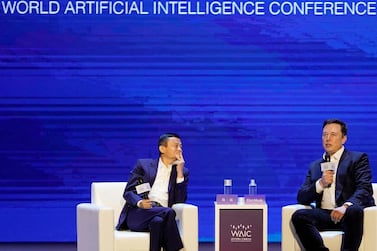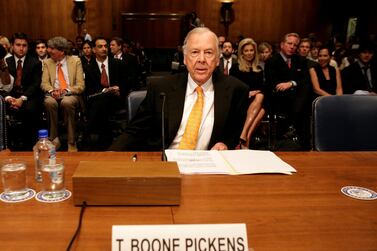Jack Ma
A tearful Jack Ma formally stepped down as Alibaba chairman earlier this month, donning a guitar and a rock star wig at an event for thousands of employees of the e-commerce giant he founded 20 years ago.
During a four-hour celebration in an 80,000-capacity stadium, the billionaire delivered on his promise of a year ago to hand over to chief executive Daniel Zhang.
"After tonight I will start a new life. I do believe the world is good, there are so many opportunities, and I love excitement so much, which is why I will retire early," Mr Ma told guests and employees.
The former English teacher handed over the reins on his 55th birthday after amassing a $41.8 billion (Dh153.3bn) fortune — a trove surpassed only by India’s Mukesh Ambani in Asia, according to the Bloomberg Billionaires Index. His record-breaking rise from a bootstrapped entrepreneur working out of his apartment in Hangzhou city in eastern China in 1999 to jet-setting e-commerce mogul is one for the history books, mirroring China’s own evolution from technological backwater to world’s No 2 economy.
The total amount of goods sold across Alibaba’s e-commerce platforms rose 25 per cent last year to $853bn. By comparison, Amazon reported total sales of $277bn.
Mr Ma's exit comes as Alibaba has grown to become Asia's most valuable listed company, with a market capitalisation of $460bn. It employs over 100,000 people, and has expanded into financial services, cloud computing and artificial intelligence.
The company said that it had adopted six new core values, including a pledge to "respect the work-life balance decisions of every individual", marking a step away from Mr Ma's recent comments urging tech company employees to work nights and weekends, which sparked a nationwide debate.
Mr Ma also told attendees he hoped to see Alibaba shoulder more responsibility to improve society amid the sweeping changes brought about by technologies like big data and 5G.
"It is not easy to be a strong company, but it is more difficult to be a good company," he said. "A strong company is determined by its commercial ability, while a good company is responsible and kind."
Mr Ma will stay on as a member of the Alibaba Partnership, a 36-member group with the right to nominate a majority of the company’s board of directors.
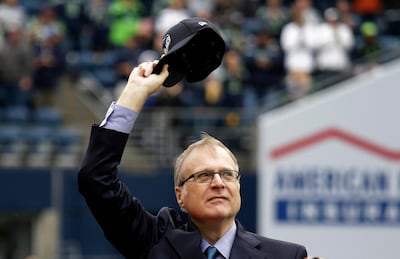
Paul Allen
The late Microsoft co-founder Paul Allen’s 126-metre super yacht “Octopus” is on the market for a cool €295 million (Dh1.19bn).
The vessel, where the billionaire partied with U2 and Mick Jagger and sailed to destinations from Venice to Shanghai, is listed at brokerages Fraser and Burgess.
Mr Allen, who died in October at 65, cofounded Microsoft with Bill Gates in 1975 and left in 1983. He turned his stake into a $26bn fortune over the next three decades, according to the Bloomberg Billionaires Index. Through his family office Vulcan, Mr Allen acquired sports teams, real estate, art and invested in start-ups. Mr Allen had no spouse or children to inherit his empire, though his sister, Jody Allen, is Vulcan’s chair.
He had a deep affinity for the German-built super yacht. When it was first delivered in 2003, Mr Allen was overwhelmed by its size — a third longer than a football field, according to his 2011 memoir Idea Man. At the time, it was the fourth-largest in the world, with the top three built for heads of state, he said.
“When I first stood on the bridge, I felt as though I was on a spaceship,” he wrote, adding that with features including a pool, basketball court, movie theatre, a recording studio with ocean views, “all my passions come together in one moveable feast”.
The vehicle, currently anchored off Antibes, France, was far more than just a pleasure craft. Capable of scientific research voyages, Octopus was designed to venture into remote places.
The super yacht has gone through an eight-month refit, according to Fraser. There’s space for 26 guests in 13 cabins, and room for 63 crew members. It has two elevators, an eight-person submarine, two helipads and garage space for helicopters and an SUV, according to Burgess.
Other than Octopus, Mr Allen’s estate also owns the National Football League’s Seattle Seahawks and the National Basketball Association’s Portland Trail Blazers. The teams are worth more than $3bn combined, according to the Bloomberg Billionaires Index.
At least half his assets were probably earmarked for charitable purposes after he joined the Giving Pledge, and an estate tax bill will apply on much of what remains as they’re liquidated.
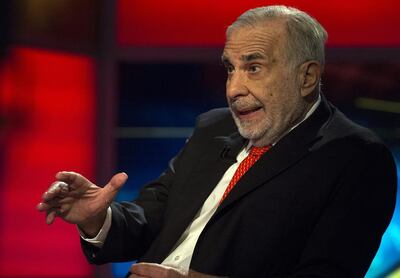
Carl Icahn
American Carl Icahn, the founder of Icahn Enterprises, is reportedly planning to move his home and business to Florida to avoid New York’s higher taxes.
Mr Icahn, 83, who was born in New York, has been an icon on Wall Street for decades. In the 1990s, he bought a mansion in the exclusive Indian Creek island enclave on Biscayne Bay in Miami.
The move is scheduled for March 31 and employees who don’t relocate won’t have a job, said the people, who asked not to be identified because the matter was private. A representative for Mr Icahn declined to comment.
Hedge fund billionaires have relocated to Florida for tax reasons for years — David Tepper, Paul Tudor Jones and Eddie Lampert being among the most prominent. But Florida officials have been aggressively pushing Miami as a destination for money managers since the Republican-led tax overhaul. Signed by US President Donald Trump in 2017, it set a $10,000 cap for state and local tax deductions, including income and real estate taxes.
Florida is one of seven states without a personal income tax, while New York’s top rate is 8.82 per cent. Florida’s corporate tax rate is 5.5 per cent, compared with 6.5 per cent in New York.
The difference could mean dramatic savings for Mr Icahn, who is the world’s 47th richest person with a personal wealth of $20.4bn. according to the Bloomberg Billionaires Index.
Icahn Enterprises has a market value of $13.6bn and reported adjusted earnings before interest, taxes, depreciation and amortisation of $1.6bn in 2018, according to Bloomberg.
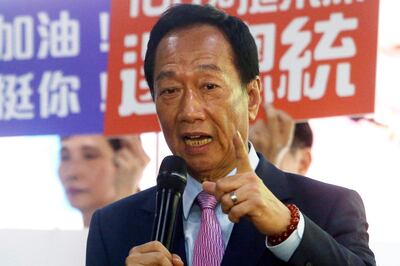
Terry Gou
Terry Gou, the billionaire founder of Foxconn, pulled out of next year’s presidential election in Taiwan.
Mr Gou apologised to his supporters in a statement on Facebook last week outlining his decision to withdraw from the race as an independent. He quit the opposition Kuomintang party last week after coming under pressure from leaders, including former President Ma Ying-jeou, to drop out of the race and support their nominee to help return the China-friendly party to power.
“With this poor election climate and prevailing populism, I’m not willing to participate in this political farce, not only for my own personal and factional interests, but also because class struggle is tearing Taiwan apart,” Mr Gou said in a video.
Shares in companies controlled by Mr Gou slumped Tuesday. FIH Mobile was the worst performer on Hong Kong’s Hang Seng Composite Index, tumbling as much as 23.2 per cent. His flagship Hon Hai Precision Industry fell 2 per cent in Taipei.
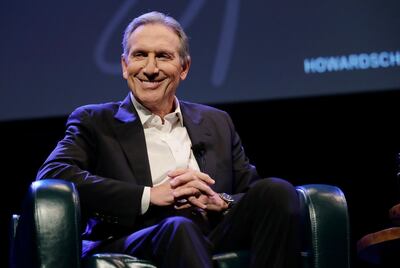
Howard Schultz
Another billionaire on the other side of the world has pulled out of a presidential race. Former Starbucks chief executive Howard Schultz said he’s no longer considering an independent bid for the US 2020 election.
“I have concluded that an independent campaign for the White House is not how I can best serve our country at this time,” Mr Schultz said early this month in a letter posted on his website.
Mr Schultz faced intense resistance from Democratic activists who feared an independent run would give US President Donald Trump an easier path to reelection. Mr Schultz says not enough people are willing to back an independent because they fear doing so “might lead to re-electing a uniquely dangerous incumbent president”.
Mr Schultz announced in June he was taking a “detour” from a possible independent 2020 bid, citing health concerns. The billionaire businessman said at the time he’d revisit his presidential ambitions after Labour Day.
